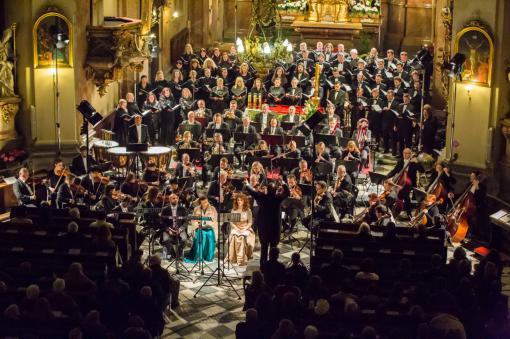As happened last year, this year’s Easter Festival of Religious Music, with the subtitle of ‘Witness’, ended with the Brno Philharmonic Orchestra and the Czech Philharmonic Choir Brno. The Church of St. John on Minoritská street resounded to a work that was very close to the main theme of the festival – the story of Paul of Tarsus in the shape of Mendelssohn’s oratorio St. Paul.
If the Easter for Christian culture is the most important symbol of hope, then the oratorio St. Paul by Felix Mendelssohn-Bartholdy is the right way to end the festival, especially in terms of its theme. The story of the conversion of Paul of Tarsus, originally a fanatical opponent of the Christian faith, was turned by the romantic composer into an oratorio in 45 parts lasting more than two hours. In this work he openly drew inspiration from the oratorios of Johann Sebastian Bach (yesterday’s concert offered a version shortened by several movements). Mendelssohn was a great admirer of Bach – and if it hadn’t been for him the Baroque genius possibly would not have become so widely known and who knows, maybe his works would not have been preserved. The combination with Bach’s Matthew Passion, heard in the opening concert, gave the festival programme a dramatic curve. The opening and closing works were linked not only narratively but also in terms of historical context. The works of two significant composers from the German protestant environment were performed.
Already the first bars showed that in acoustic terms the Church of St. John was a much better choice than Brno Cathedral had been last year. The Brno Philharmonic Orchestra performed in the concert with lyrical strength and the conductor Leoš Svárovský properly allowed the intensity of the sound to grow steadily. The fortissimo which the orchestra and choir reached, did not become deafening in the full church – rather it resonated pleasantly in the space.
Immediately after the overture the soloists Ján Rusko and Roman Hoza made an impression. Their signing was heroic yet fresh. In the recitative dealing with the stoning of St. Stephen Rusko sang with great naturalness. The following aria Und die Zeugen legten ab ihre Kleider was sung by the soprano Marie Fajtová with less vibrato than in the remainder of the oratorio. And that was good. Its abundance in the other recitatives was a little disturbing, though not fundamentally so. The Czech Philharmonic Choir Brno displayed their usual compactness – their sound reached the audience in a rounded balanced form, even in the quieter and acapella sections.
Ján Rusko with Roman Hoza made up an excellent duo. In duets, the colours of their voices mingled pleasantly, but otherwise it was interesting to observe their interpretational differences. While Rusko plunged with operatic drama into his solo parts, Hoza concentrated on more careful pronunciation of the German text. That however – it seemed – did not support the voice much, especially in the lower registers. The famous passage dealing with Saul’s repentance, was performed wonderfully, the interpretation having gradation, moderation and above all humility. And that in a work of this spiritual nature is a fundamental element.
A voice full of character was demonstrated by the mezzosoprano Štěpánka Pučálková. Ear-catching colour was delivered by her and heard across the voices and one could complain that her part did not have more space in this oratorio.
Before the end of the first part Ján Rusko excelled in the recitative, which was followed by the monumental quasi-finale of the choir. The sudden transition to the Baroque-leaning fugue was managed well by the choir, with their excellent rapid diction. The Choir was properly aggressive in the second half and sometimes even dominated the whole orchestra, which paradoxically given the overall nature together of the work, mattered little. While in the last quarter of the oratorio Rusko showed a certain evident tiredness in his voice (which unfortunately in the cavatina also showed in his intonation), Marie Fajtová produced one of her most beautiful moments in one of the last recitatives – the very subtle position suited her best.
The closing hymn in the form of a choral fugue the choir under Petr Fiala performed imposingly and so lived up to its reputation– that it is truly a joy to listen to it.
The Easter Festival, with its programme covering a wide spectrum of works from medieval to modern, once more finished with a larger romantic piece. This traditional choice can be understood variously, however the legacy of Mendelssohn’s oratorio is crystal clear (as is the obvious link to the inaugural concert), his composition is attractive. And what is more – yesterday’s performance by the interpreters was truly very good.
Felix Mendelssohn-Bartholdy: St. Paul, oratorio, op. 36 for soloists, mixed choir and orchestra. Marie Fajtová – soprano, Štěpánka Pučálková – mezzosoprano, Ján Rusko – tenor, Roman Hoza – baritone, Czech Philharmonic Choir Brno, choirmaster – Petr Fiala, Brno Philharmonic Orchestra, conductor – Leoš Svárovský. 23 April, Church of St. John, Brno. Closing concert of 26th Easter Festival of Religious Music 2017

































No comment added yet..